Our experiences from a spontaneous day of teaching English in Iran, in the small town of Mobarakeh. The students weren’t the only ones who learned a thing or two!
A mob of googly-eyed teenage girls surrounded us. As they surged forward, notebooks and writing pads were eagerly thrust out, and pens circulated the crowd. Glowing phones were visible through the tangle of arms and legs, ready to take advantage of prime selfie opportunities the next time a gap opened up in the jostling throng.
The scene wouldn’t have been out of place at a Justin Bieber concert, but the reality was far from: this is what happened when we spent a day teaching at English schools in a tiny Iranian town.
Teaching English in Iran
English teaching throughout much of Iran is in a sorry state. Though all students undergo several years of English in school–more, if they attend university afterwards–their quality of English at graduation is dubious at best.
During our visit, we met a girl who was on track to graduate with a Bachelor’s degree in English in several months’ time. She had to tell us this in Farsi, then have one of her English teachers translate. Her final assignment for university: transcribing 15-minutes of news clips–in accented non-native English–from the Japanese NHK television channel. She couldn’t even spell “Iranian” correctly.
This isn’t the students’ fault, but rather a lack of quality teaching… and a lack of teachers that can actually speak English. Because of the strict policies regarding visitors to Iran, particularly for American/British/Canadian citizens, there aren’t many native English teachers to go around!
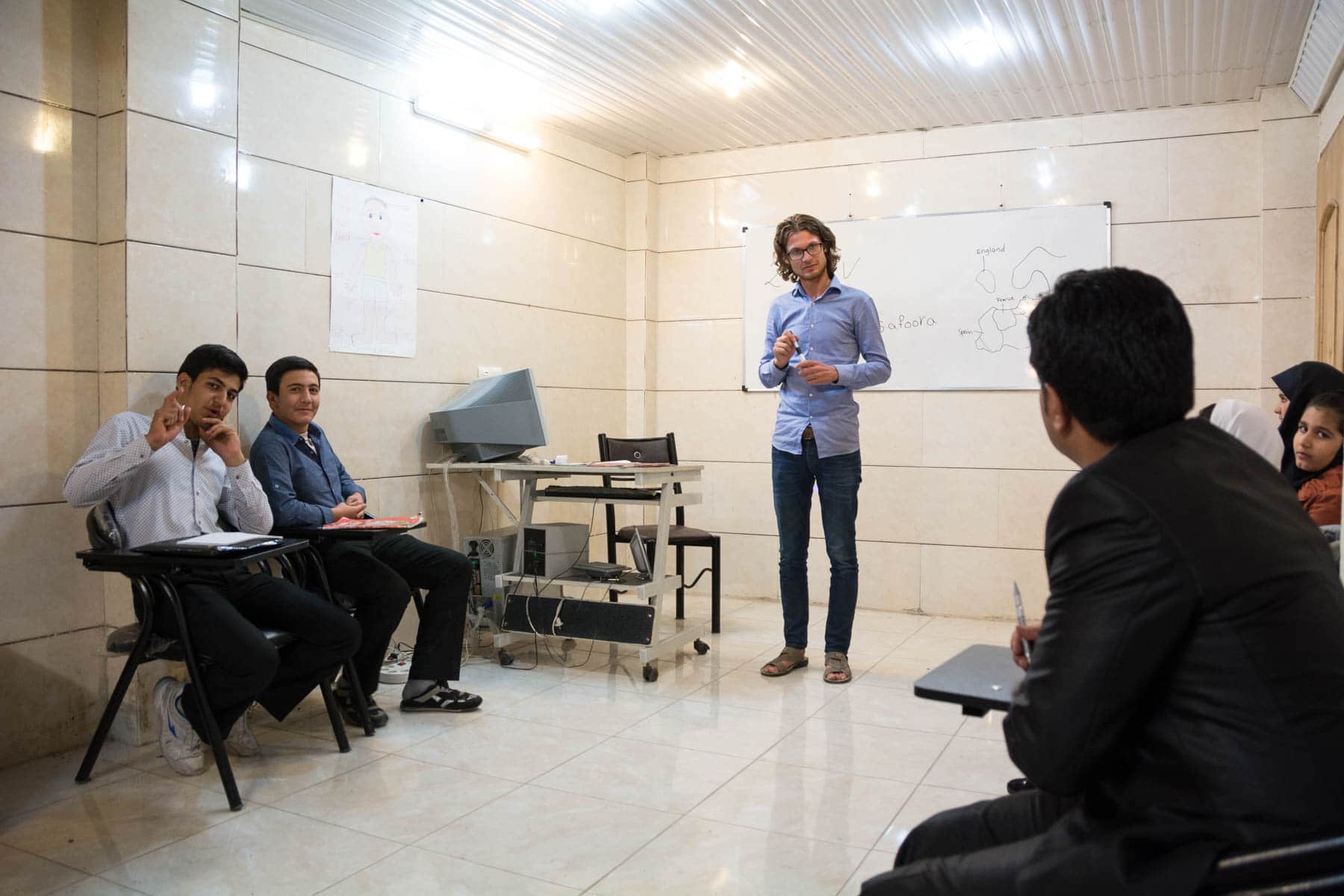
Not enough native teachers to go around, indeed… guess we’ll have to settle for a Dutchie instead.
Superstars from afar
Given the lack of native instructors, you can imagine the excitement of the teachers and students when we were shepherded into their classes. Not only were Sebastiaan and I respectively fluent and native English speakers, we were also the first foreigners that some of them had ever seen. The reaction wouldn’t have been much different if we were aliens that had just disembarked from their space ship from a distant galaxy.
(An English-speaking galaxy, of course.)
Timid at first, then gradually relaxing as they realized we could indeed understand their questions, the students began to flex their English skills. Throughout the day, we had to answer a plethora of standard “How old are you?” and “What is your favorite food?” questions… but occasionally we were confronted with more frank queries:
“What do you think of chador?” one girl in the first class asked, referencing the long black cloaks that conservative Muslim women wear in Iran. I think they make women look like Batman was the first thought that came to mind, but that’s probably not the best response to give to a stranger wearing a chador.
A few minutes later, the girls played dress-up with me, cloaking my body with one of their chador. The same girl looked at me and burst out laughing. “How do you feel? You look like Batman!”
… heh.
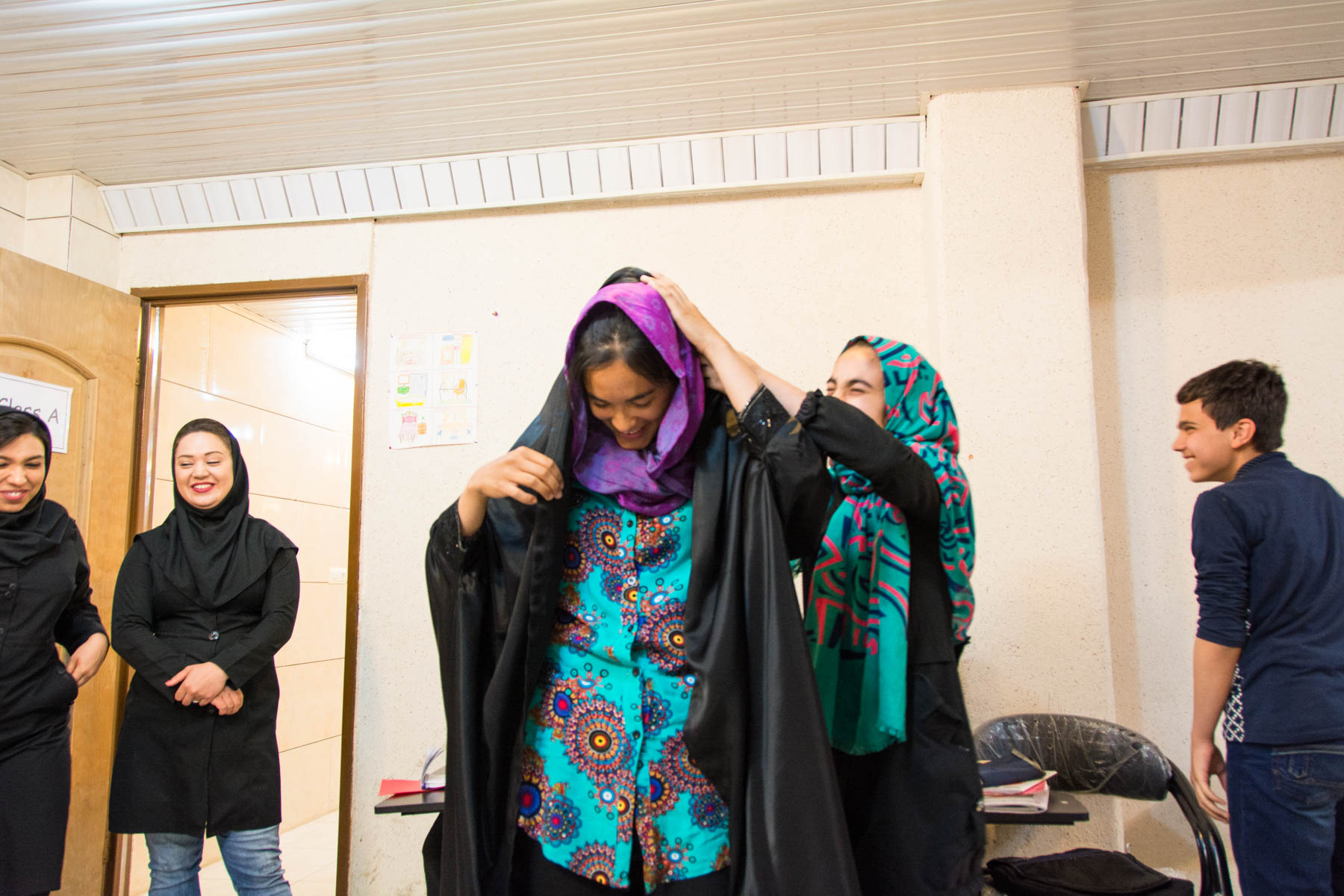
Da na na na na na na na BATMAN!
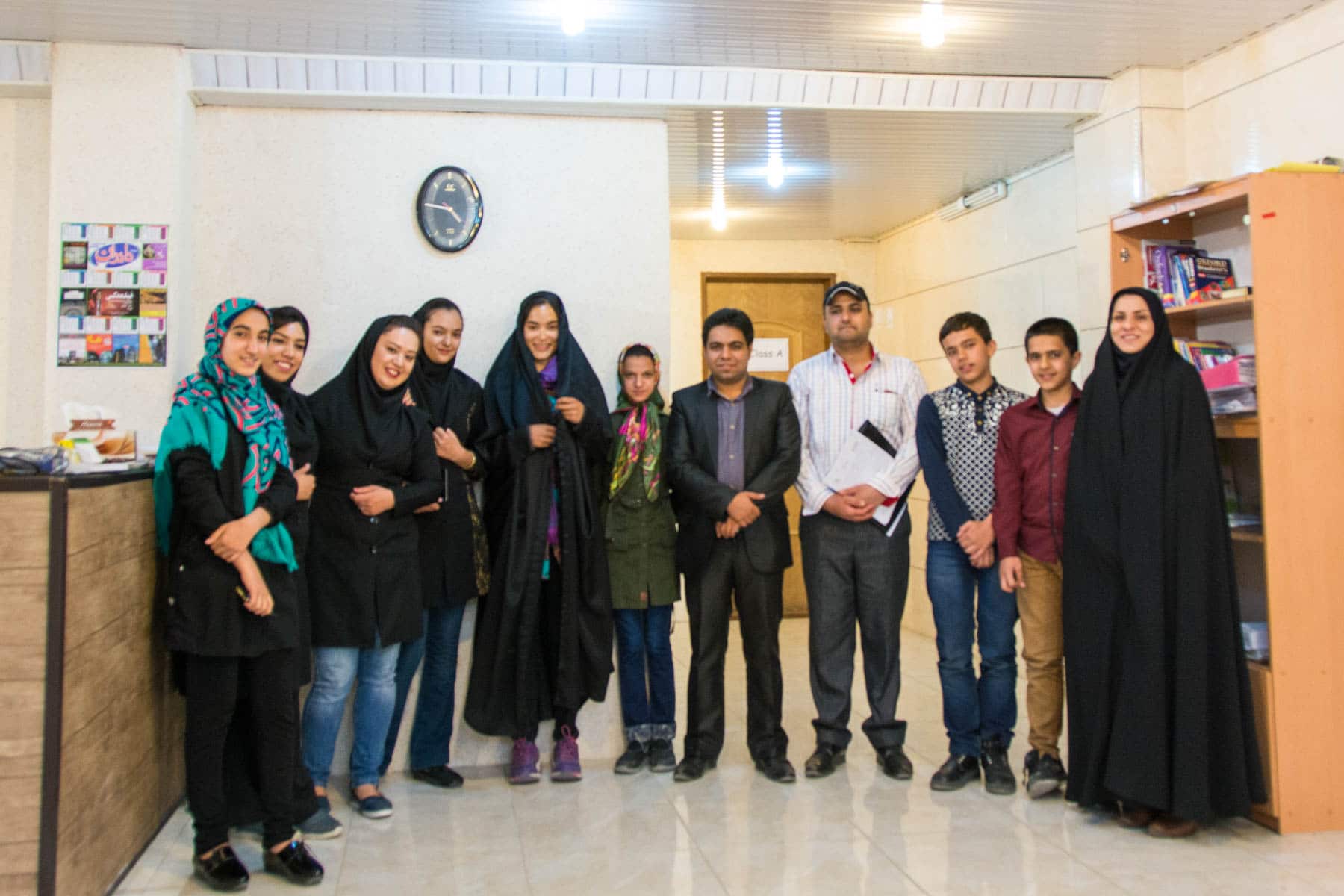
Blending in ever so well.
Hard questions and heavy answers
Though we were there so the students could learn from us, we ended up learning a bit about them, too. Most of the questions and answers were met with giggles and grins, but not all were so lighthearted.
At one point, Sebastiaan asked the class of teenage girls what other countries they would like to visit, if they could go anywhere in the world. One shy girl held up her hand to respond.
“I want go to… America,” she answered slowly, taking time to find her words.
“Why America?”
“… so I no… have… wear hijab.” Hijab is a head scarf that women are required to wear in Iran by law.
The other girls nodded vigorously in agreement, and started speaking in Farsi. The teacher stepped in to translate for us: “The girls just want to travel to any country where they do not have to wear their hijabs.” Oh.
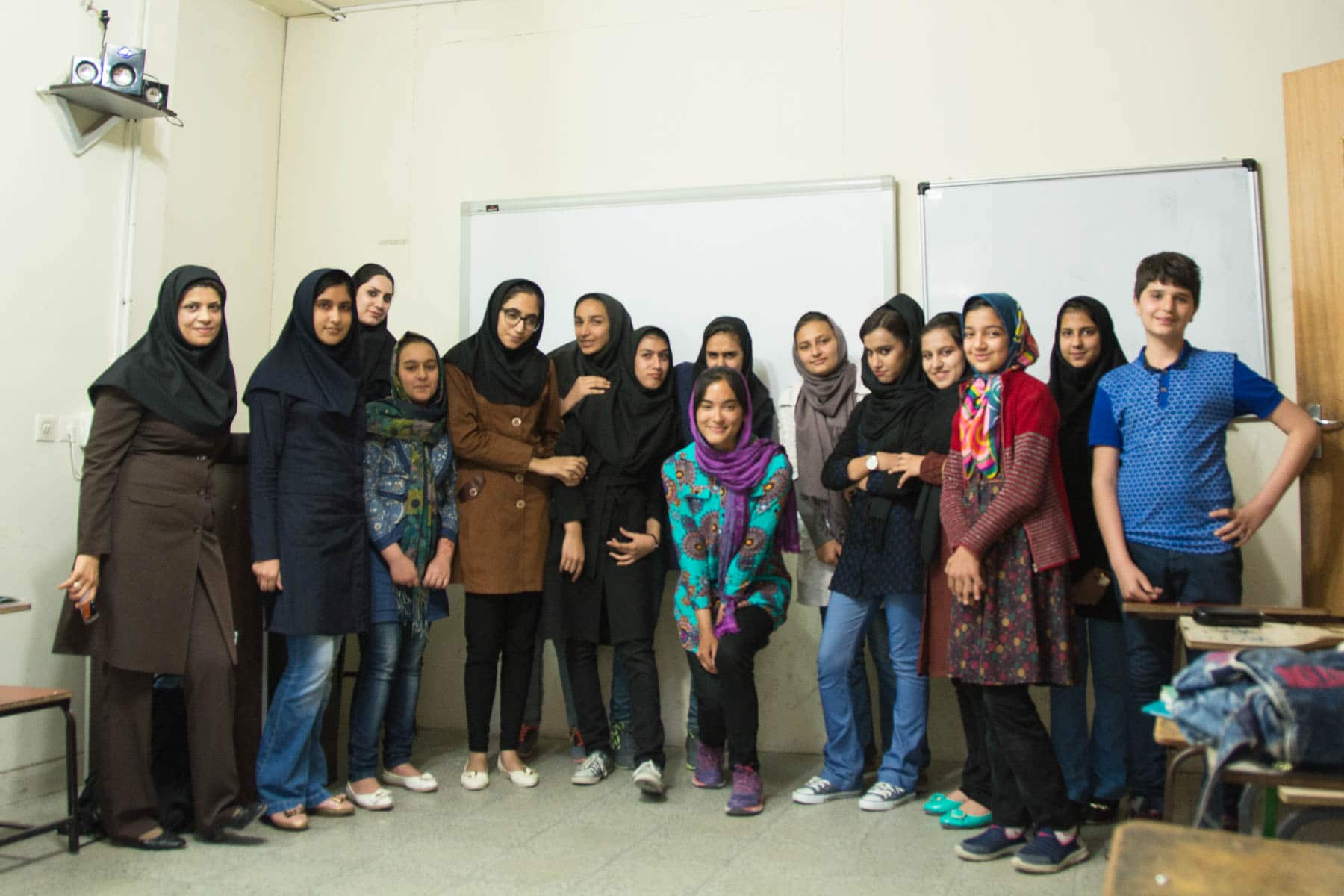
Happy… but hijab’ed.
The last question of the day came late that evening, when relaxing at a man’s house. Students and newfound friends were honoring our arrival by jamming on a mixture of traditional and modern instruments. In the meantime, Sebastiaan and I were still taking questions from the ever-curious and eager crowd.
After some prodding by her English teacher, the host’s teenage daughter approached me to practice her speaking. Most of her questions were standard textbook questions, but the last one was heavy on my heart.
“Why are Americans so afraid of Iranians?” she asked hesitantly, nothing but innocence in her eyes.
After these past few weeks of traveling in Iran, and the endless amounts of help, hospitality, friendliness and love we’ve received… I can’t say I know the answer to that one. Why are they, indeed?
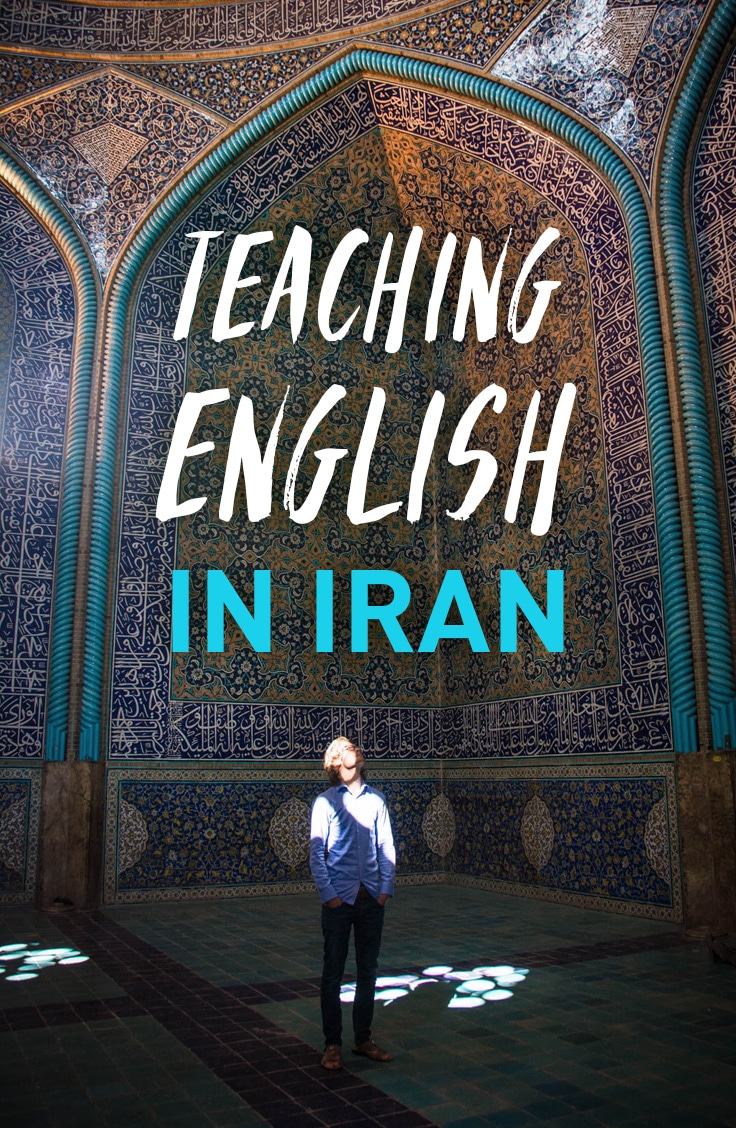
Did you like this story? Why not Pin it?
Have you ever taught a language in a foreign country? What was your experience like?
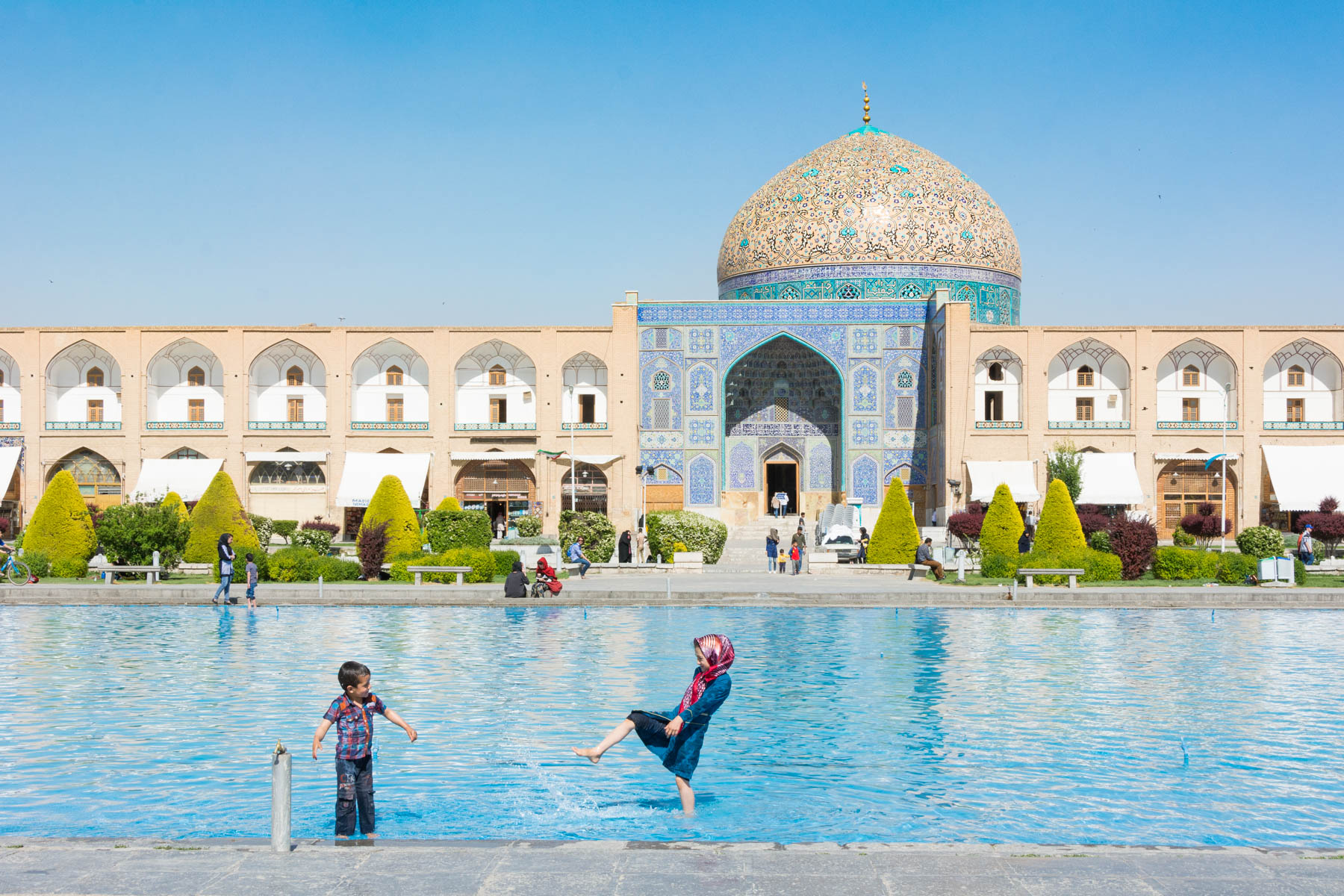


Hi I only found this post. Do you know now in 2018 how a Polish / British passport holder can apply for teaching in Iran and what qualification one needs? I have a BA in English from University of Wroclaw – I know Polish passport is better now to get to Iran. let me know any tips! thank you
May I ask how you found the school you visited?
Hi my name is Adele Gribbon,
I have been very much in love with Persian culture my whole life. It was a mild interest for me in the beginning but now is something I want to pursue with more clarity. I will be visiting Iran in November. I am Irish. I would love to teach English in Iran as a career. I have a Batchelor’s Degree and I am studying the highest level of TEFL right now and I hope to be finished the course in the next few weeks. If anyone could give me any help or advice I’d love to hear from you. I’d be happy to meet with anyone who can help me in November. My email is gribbona@tcd.ie.
Many Thanks.
Hi,
I am an English teacher in Manchester, England and I would be VERY interested in teaching my specialist subjects of ‘English’ and ‘Philosophy’ to children in Iran; I’m ESPECIALLY interested in going towards the Alamut district, possibly Qasvin? Or any other areas which are as close to alamut region as I could get if I could find work – I would even consider finding work in farms or anything else if anyone knew anyone near the alamut valley? but as I do not know much about Iran or the surrounding areas I thought it might be best to find work in Tehran as an English teacher and then try to move towards the alamut region … Any advice from someone more knowledgeable than my self would be VERY MUCH appreciated 🙂 kind Regards, Izzy
Dear Alex
Very interesting trip story. But observations of a cozy town may not be overgeneralized to a multiethnic, multilingual, multicultural, multi-geography, under-resourced-public-education country like Iran. However, I enjoyed the anecdote a lot.
Mohammad Ghasemi Bagherabadi .
What a biased article! First of all, if you visit any small town in almost any non-English speaking country where people are not white, you will receive a similar reaction; you will be attracting attention and it’s only natural.
Secondly, the presence of native English teachers is not an indication of a country’s success or failure in language education. After all, only a small percentage of the world population speaks English as their mother tongue.
Plus, you should have specified the language proficiency level of the class you have been allowed to visit to give your readers a true sense of how bad those questions have been.
Hi
Im an iranian english teacher the article is actually not biased
Its true that teaching english in iran is in poor shape
And many girls wish for freedom in what they wear
If you wish to visit iran i will do all i can to help
But beware that you probably wont be able to work in public schools as there is a were thugh criteria religuse wise
You could theach in private institues but the payment is not good
Contact me if you want more info
Also i wish to immigrate and teach abroad too if you can help i would apreciate it
My email is :parisa.nozari.pak@gmail.com